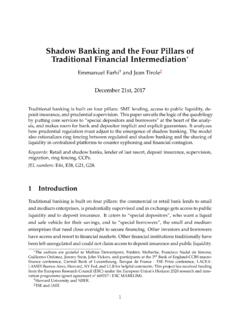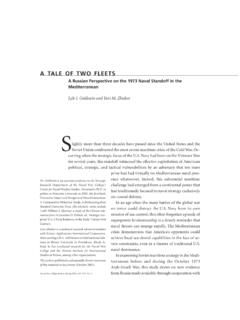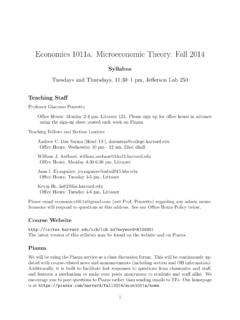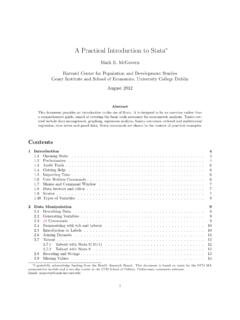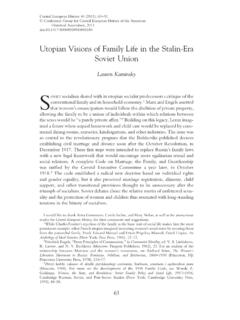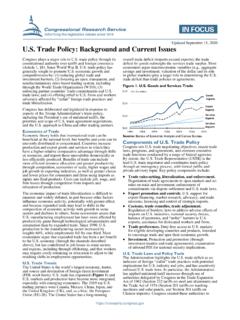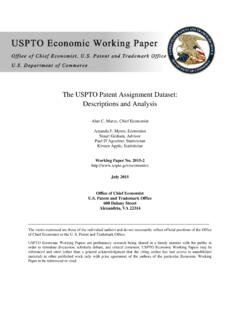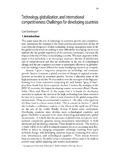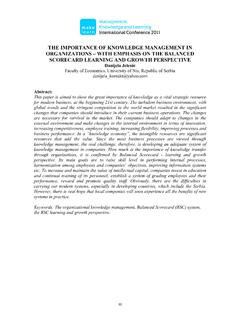Transcription of THE KNOWLEDGE ECONOMY - Harvard University
1 11 Jun 2004 16 (2002/01/18)P1: Rev. Sociol. 2004. 30:199 220doi: 2004 by Annual Reviews. All rights reservedFirst published online as a Review in Advance on February 20, 2004 THEKNOWLEDGEECONOMYW alter W. Powell1,2,3and Kaisa Snellman21 School of Education and2 Department of Sociology, Stanford University , Stanford,California 94305;3 Santa Fe Institute, Santa Fe, New Mexico 87501;email: Wordsknowledge, productivity, workplace reform, distributional effects oftechnological change AbstractWe define the KNOWLEDGE ECONOMY as production and services based onknowledge-intensive activities that contribute to an accelerated pace of technical andscientific advance, as well as rapid obsolescence. The key component of a knowledgeeconomy is a greater reliance on intellectual capabilities than on physical inputs ornatural resources. We provide evidence drawn from patent data to document an upsurgein KNOWLEDGE production and show that this expansion is driven by the emergenceof new industries.
2 We then review the contentious literature that assesses whetherrecent technological advances have raised productivity. We examine the debate overwhether new forms of work that embody technological change have generated moreworker autonomy or greater managerial control. Finally, we assess the distributionalconsequences of a KNOWLEDGE -based ECONOMY with respect to growing inequality inwages and high-quality the past several decades, a number of scholars and commentators have ar-gued that the leading edge of the ECONOMY in developed countries has becomedriven by technologies based on KNOWLEDGE and information production and dis-semination. These new technologies which emerged in the late 1950s, expandedwith the proliferation of personal computers, and then surged dramatically withthe widespread use of email and the Internet have considerable potential to re-make the nature of work and the ECONOMY .
3 Nevertheless, our understanding of thepurported KNOWLEDGE ECONOMY remains rather hazy, clouded by both enthusiastsand doomsayers who are quick to offer labels and assessments without much at-tention to evidence. Still others see a growth industry in providing professionalservices to organizations and nations to assist them in the transition to KNOWLEDGE -intensive modes of production. If the KNOWLEDGE ECONOMY is measured by the risein KNOWLEDGE management services among consulting firms or by the rapid growthin intellectual property as a legal specialty, then its growth has been , however, argue that much of the growth is precisely in selling information0360-0572/04/0811-0199$ Rev. Sociol. :199-220. Downloaded from Stanford Univ. Robert Crown law Lib. on 06/01/06. For personal use Jun 2004 16 (2002/01/18)P1: IBC200 POWELL SNELLMAN technology and related services. Our aim in this chapter is to sort through thesedebates and provide an overview of the scholarly literature in the social scienceson the KNOWLEDGE -based ECONOMY .
4 We present evidence for the acceleration inknowledge production and discuss the key issues that have been addressed by theempirical broad label KNOWLEDGE ECONOMY covers a wide array of activities andinterpretations. At least three lines of research fall under this umbrella. The oldestapproach, with its origins dating back to the early 1960s, focuses on the riseof new science-based industries and their role in social and economic analysts include professional services and other information-rich industriessuch as publishing in this category, noting the marked growth in employment inthese sectors of the ECONOMY over the past three decades (Machlup 1962, Porat1977, Stanback 1979, Noyelle 1990). A core idea unifying this strand of workis the centrality of theoretical KNOWLEDGE as a source of innovation (Bell 1973).With some stretching, the new growth theory in economics (Romer 1986, 1990)could be included here as this work stresses the importance of KNOWLEDGE ineconomic growth, noting that discoveries differ from other inputs because they arenonrivalrous and fuel further has been a good deal of debate in the economicsfield over whether partic-ular industries are especially KNOWLEDGE -intensive.
5 Much effort has gone into ana-lyzing how much these sectors contribute to growth in productivity (Brynjolfsson& Hitt 2000, Gordon 2000). Because the expansion of KNOWLEDGE -intensive in-dustries and the accompanying productivity increase occurred in the context ofunusual macroeconomic andfinancial-market developments in the 1990s, a gooddeal of popular literature asserted that the KNOWLEDGE ECONOMY operated differentlyfrom the past in some fundamental way. Although few scholars now accept suchclaims, much recent research in sociology and labor economics has focused onwhether new kinds of jobs and novel forms of work organization have emerged inrecent years. The degree to which new modes of work are particularly tethered tothe KNOWLEDGE ECONOMY is not altogether clear, and just how different these workarrangements are from older ones is the subject of much debate (Kochan & Barley1999).
6 A third strand of work is much more narrow and managerial in orientation,focusing on the role of learning and continuous innovation insidefirms (Drucker1993, Nonaka & Takeuchi 1995, Prusak 1997). Some organizations appear to beparticularly good at KNOWLEDGE production and transfer, and researchers are inter-ested in understanding why and whether these practices can be replicated. Suchinquiry is potentially widely applicable, but the core concern of this line of workhas been more applied. The broader sociological and economic implications con-cerning whether KNOWLEDGE is codified or tacit, and what kinds of social arrange-ments enhance or impede KNOWLEDGE generation and transmission have recentlybegun to attract attention (Cowan et al. 2000). Still, systematic empirical researchon this topic is scarce and has not dealt with its implications for Rev. Sociol. :199-220. Downloaded from Stanford Univ.
7 Robert Crown law Lib. on 06/01/06. For personal use Jun 2004 16 (2002/01/18)P1: IBCTHE KNOWLEDGE ECONOMY201We d efine the KNOWLEDGE ECONOMY as production and services based onknowledge-intensive activities that contribute to an accelerated pace of techno-logical and scientific advance as well as equally rapid obsolescence. The keycomponents of a KNOWLEDGE ECONOMY include a greater reliance on intellectualcapabilities than on physical inputs or natural resources, combined with efforts tointegrate improvements in every stage of the production process, from the R&Dlab to the factoryfloor to the interface with customers. These changes are reflectedin the increasing relative share of the gross domestic product that is attributableto intangible capital (Abramovitz & David 1996). Of course, many alternativelabels and definitions are more expansive than ours, but we choose to keep thefocus on the production of novel ideas that subsequently lead to new or improvedgoods and services and organizational begin with a review of the evidence in support of the argument that key sec-tors of the ECONOMY are more reliant on KNOWLEDGE generation and disseminationtoday than they were in the past.
8 We then turn to the debate regarding whetherrecent technological advances have, in fact, raised productivity. We note that manyof the most far-reaching effects of any new general purpose technology are notfully realized unless accompanied by related organizational and social adaptations(Rosenberg 1982, Bresnahan & Trajtenberg 1995, Helpman 1998). We examinethe evidence as to whether new forms of moreflexible work practices that em-body technological change are becoming prevalent. We note that employment andwork are becoming disaggregated, as more tasks are performed outside of theformal boundaries of afirm. We then consider distributional consequences of aknowledge-based ECONOMY , in terms of wages, unemployment, and ACCELERATION IN KNOWLEDGE PRODUCTIONS ince the 1970s, many researchers have noted the transition that has occurred inadvanced industrial nations from a manufacturing-based to services-driven econ-omy.
9 This change often goes by the labels postindustrial or post-Fordist (Bell1973, Hirschorn 1984, Block 1990). Such a stark view of economic transformationmisses an even more profound change in which the distinction between manufac-turing and services has been rendered moot. Consider the automobile, the icon ofthe old Fordist, manufacturing ECONOMY . A new car today is less and less theproduct of metal fabrication and more a smart machine that uses computer technol-ogy to integrate safety, emissions, entertainment, and performance. The computergames, produced on assembly lines in Asian factories, with which teenage boysare so addled are sophisticated information processing devices, with both speedand graphics capability that exceed the largest supercomputer of a decade , with its innovative use of collaborativefiltering that tells consumerswhat people with similar tastes are watching, listening to, and reading, dependssimultaneously on a warehousing system out of the factory era and on an Internet-based retail operation.
10 These varied illustrations point not only to the blurring ofAnnu. Rev. Sociol. :199-220. Downloaded from Stanford Univ. Robert Crown law Lib. on 06/01/06. For personal use Jun 2004 16 (2002/01/18)P1: IBC202 POWELL SNELLMANthe manufacturing-services distinction but also to the very considerable extent thatknowledge can be embodied in both goods and services. Economists have notedthat these changes in production are part of a broader shift from tangible goodsto intangible or information goods (Shapiro & Varian 1999). The replacement ofanswering machines by voice mail and multivolume encyclopedias by CD-ROMSare but two illustrations of this challenge for social science has been tofind metrics to gauge the extent towhich society has become more dependent on KNOWLEDGE production. Althoughthere is wide recognition of the importance of KNOWLEDGE and intangible capi-tal in fostering economic growth and social change, devising useful measures ofthese assets has been difficult.


